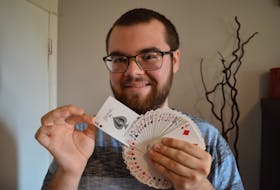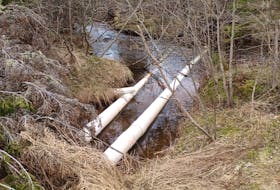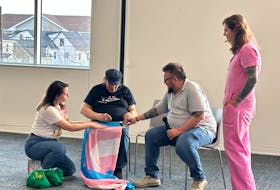SUMMERSIDE, P.E.I. - Heavily used parks and walkways around Summerside have been swept for ticks to test a new protocol.
A crew from the Bedeque Bay Environmental Management Association (BBEMA) and the City of Summerside are testing a protocol called “tick dragging” to track habitats, locations and identification, as well as determine if there’s any threat posed to the public by the blood-sucking pests.
“BBEMA is elaborating a Biodiversity Action Plan for the City of Summerside, which is a framework for the management of natural resources and wildlife concerns throughout the City. As part of this action plan, BBEMA was approached by City staff to look into Tick Surveillance in Summerside,” explained Kurt Hughes of BBEMA.
“We are laying down ground-work for a program that may be continued by City Staff in the future, if they desire. The City itself is at no special risk from ticks, but we are partnering to take a pro-active approach by seeking more information on the situation before, or if it becomes an issue at all,” he continued.
“We aren’t combing the entire city for ticks or trying to highlight high risk areas, mostly testing a protocol we developed with some advice from Lloyd Lad from Mount Allison University Lyme Disease research. BBEMA will do a few drags around Summerside in the fall and summer.”
Crews dressed in white Tyvek will pick up the tiny ticks – the size of a “poppy seed” – on weighted white sheets they pull behind them through tall grass.
Ticks naturally cling to the felt fabric that resembles animal fur, during the tick dragging process.
“The felt is attached to a bar to weight it down and that’s dragged through the grass. The felt is white, so they can easily be seen. We’ve collected around three to four ticks, and they will be sent off to a lab for analyzation,” explained Tracy Brown, BBEMA’s executive director.
“Crews are collecting ticks to identify the species and see if they are the ones that carry Lyme disease and if so, look at prevalence. We do have native ticks on the Island, but not the actual species that are tagged with Lyme disease, like on the mainland,” she noted.

“If you do find a tick on your dog the best thing to do is to call your local vet and have it removed by them because many are collecting ticks for the study, too.”
Ticks are primarily found at the edge of woodland habitats, on grasses or shrubs.
“Wearing long pants, long sleeved shirts, getting pets vaccinated or using insect repellant when spending time in wooded areas are good ways to prevent tick interactions,” said Hughes.
P.E.I. is not at any special risk, but it is still important be aware and protected.
He continued, “In general, climate change is thought to be a factor in the increase of many vector-borne diseases. The warm-dry habitat that the ticks enjoy could become more common, meaning more ticks and chances for infections to occur, although they are currently quite low on the Island.”
Migratory birds could spread Lyme disease carrying ticks from the mainland to P.E.I.
“In 2012 there was the first lab-confirmed case found on P.E.I. of a tick containing the bacteria that causes Lyme disease that was not directly associated to travel outside of the Island, so yes it can be found here. But there has not been a confirmed case of this tick found in areas of the City from our past surveillance,” concluded Hughes.
Findings from the tick dragging process will be shared by BBEMA and the City.








